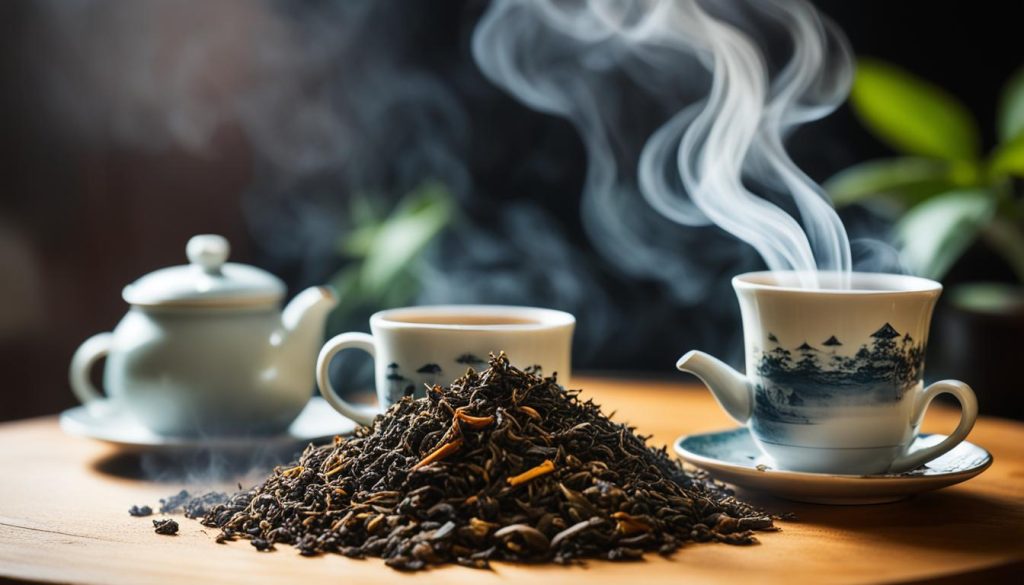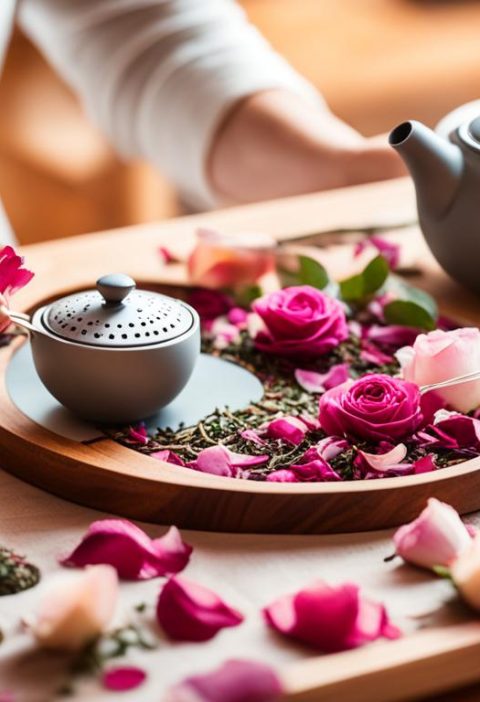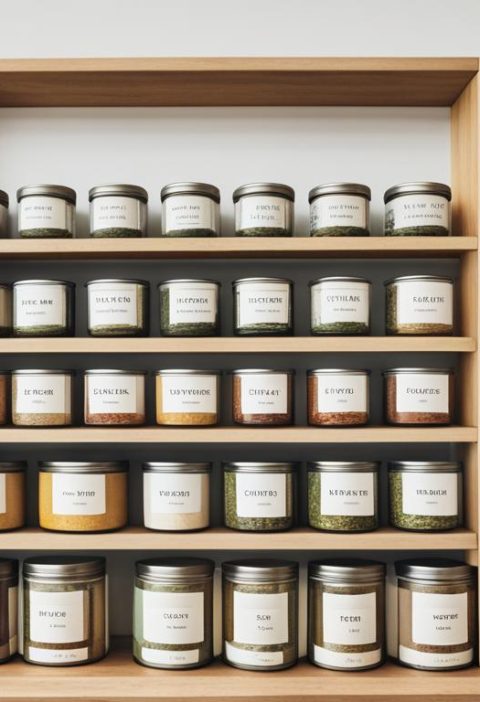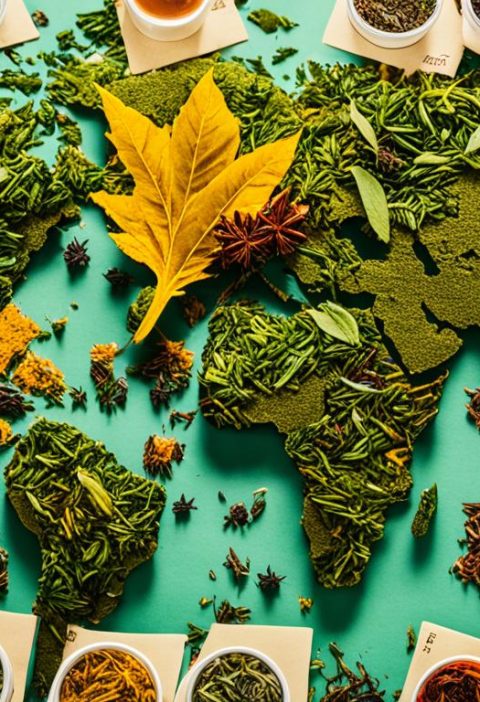Pu-Erh tea is a remarkable brew that has captured the hearts of tea enthusiasts around the world. Originating from the Yunnan province of China, this ancient tea variety is renowned for its unique fermentation process and numerous health benefits. In this article, we will delve into the mysteries of the Pu-Erh tea aging process, taking you on a journey through the transformative stages that result in its exquisite flavors and aromas.
Key Takeaways:
- Pu-Erh tea undergoes a fermentation process that gives it a distinct flavor and character.
- The aging of Pu-Erh tea allows it to develop complex flavors and aromas over time.
- Different varieties of Pu-Erh tea, such as raw and ripe, offer unique taste profiles.
- Pu-Erh tea is rich in antioxidants and has numerous health benefits.
- Proper storage and brewing techniques are essential for preserving the quality of Pu-Erh tea.
The Types of Pu-Erh Tea: Raw Versus Ripe
Pu-Erh tea, a beloved brew with a rich history, offers a delightful range of varieties, each boasting unique flavors and characteristics. Let’s delve into the two main types of Pu-Erh tea: raw (Sheng) and ripe (Shou).
Raw Pu-Erh
Raw Pu-Erh is a tea that undergoes a natural fermentation process over an extended period, often years or even decades. This aging process results in a distinguished complexity of flavors, making raw Pu-Erh highly sought after among tea enthusiasts. It is known for its earthy, floral, and mellow taste that evolves with each infusion.
Ripe Pu-Erh
Ripe Pu-Erh, in contrast, undergoes an accelerated fermentation process commonly referred to as “wet piling.” This technique speeds up the aging process and results in a dark, reddish-brown liquor with a bold and robust flavor. Ripe Pu-Erh is often described as earthy, woody, and sometimes even sweet, providing an invigorating and full-bodied tea experience.
Both raw and ripe Pu-Erh teas offer unique qualities and health benefits, allowing you to choose the variety that aligns with your personal preferences. Whether you prefer the nuanced complexity of raw Pu-Erh or the bold intensity of ripe Pu-Erh, there is a Pu-Erh tea variety for everyone.
Explore the exquisite flavors and aromas of Pu-Erh tea, and discover the captivating world of this ancient brew.
| Pu-Erh Tea Varieties | Taste Profile |
|---|---|
| Raw Pu-Erh (Sheng) | Earthy, floral, mellow |
| Ripe Pu-Erh (Shou) | Bold, robust, earthy, woody |
The Nutritional Content of Pu-Erh Tea
Pu-Erh tea offers not only a delightful taste but also a wealth of beneficial compounds that support overall health and wellness. This ancient brew is known for its high content of polyphenols, caffeine, theanine, vitamins, and minerals.
Polyphenols: Antioxidant Powerhouses
Pu-Erh tea is rich in polyphenols, a group of antioxidants that help protect the body against oxidative stress and reduce inflammation. These powerful compounds have been linked to a wide range of health benefits, including improved heart health, enhanced immune function, and decreased risk of chronic diseases.
Caffeine: A Natural Energy Boost
Just like other types of tea, Pu-Erh tea contains caffeine, a natural stimulant that can increase mental alertness and boost energy levels. However, compared to other caffeinated beverages like coffee, Pu-Erh tea generally contains lower levels of caffeine, providing a milder and more sustained energy lift without the jittery side effects.
Theanine: Calm and Focus
Pu-Erh tea also contains theanine, an amino acid known for its calming and focus-enhancing effects. Theanine promotes a sense of relaxation and mental clarity, making Pu-Erh tea a soothing choice for a mindful break or an aid for stress management.
Vitamins and Minerals: Essential Nutrients
Besides polyphenols, caffeine, and theanine, Pu-Erh tea contains a variety of essential vitamins and minerals. These include vitamins B, C, and E, as well as minerals like potassium, calcium, and manganese. These nutrients play a vital role in maintaining optimal health and supporting various bodily functions.
| Nutrient | Amount per Serving |
|---|---|
| Vitamin C | 10 mg |
| Vitamin E | 1 mg |
| Vitamin B1 (Thiamine) | 0.01 mg |
| Potassium | 10 mg |
| Calcium | 5 mg |
| Manganese | 0.1 mg |
Note: The nutritional content may vary depending on the specific Pu-Erh tea and brewing method.
Recommended Daily Consumption of Pu-Erh Tea
When it comes to reaping the benefits of Pu-Erh tea, moderation is key. It is recommended to consume one to two cups of Pu-Erh tea per day to enjoy its unique flavors and health benefits. By starting with a conservative dosage, you allow your body to adjust to the tea and gauge your tolerance.
Gradually increasing your Pu-Erh tea consumption can be done if desired. However, it is important to avoid overconsumption, especially for individuals sensitive to caffeine. Excessive intake can lead to caffeine-related side effects such as restlessness and increased heart rate. It’s best to enjoy Pu-Erh tea in moderation and listen to your body’s response.
So whether you’re starting your day with a comforting cup of Pu-Erh tea or incorporating it into your afternoon routine, remember to keep your daily dosage in check for a balanced and enjoyable experience.
Pu-Erh Tea and Weight Loss
Pu-Erh tea has gained attention for its potential role in weight loss. Scientific studies have shown promising results, highlighting the tea’s fermentation process and high levels of antioxidants and caffeine as key factors in aiding weight management.
The fermentation process of Pu-Erh tea helps to activate enzymes that enhance metabolism, promoting the breakdown of fats in the body. Additionally, the high concentration of antioxidants in Pu-Erh tea can support the body’s natural detoxification processes, which may aid in weight loss.
Antioxidants such as catechins and flavonoids found in Pu-Erh tea have been shown to increase fat oxidation and thermogenesis, leading to a potential increase in calorie expenditure. Caffeine, another component of Pu-Erh tea, can stimulate the central nervous system and boost metabolism.
While Pu-Erh tea can be a beneficial addition to a weight loss journey, it is important to note that it is not a magic solution. To achieve sustainable weight loss, it is crucial to combine Pu-Erh tea consumption with a balanced diet and a regular exercise routine.
By incorporating Pu-Erh tea into a healthy lifestyle, individuals may experience enhanced weight management results. However, it is essential to consult a healthcare professional or registered dietitian before making any significant changes to your diet or exercise regimen.
Benefits of Pu-Erh Tea for Weight Loss
- Boosts metabolism and fat burning
- Aids in natural detoxification
- Increases calorie expenditure
- Promotes fat oxidation and thermogenesis
Safety Precautions for Drinking Pu-Erh Tea
While Pu-Erh tea is generally safe for consumption, it is important to be mindful of certain safety precautions, especially for individuals who may have caffeine sensitivity or allergies. Understanding potential side effects and taking appropriate measures can help ensure a positive tea-drinking experience.
Caffeine Sensitivity
For individuals who are sensitive to caffeine, it is crucial to be aware of the caffeine content in Pu-Erh tea. Although the caffeine levels in Pu-Erh tea are generally lower compared to coffee, excessive consumption can still lead to caffeine-related side effects such as restlessness, increased heart rate, and difficulty sleeping. It is recommended to start with small amounts of Pu-Erh tea and listen to your body’s response. If you experience any discomfort or adverse reactions, it may be best to consume Pu-Erh tea in moderation or opt for decaffeinated varieties.
Allergies
While allergies to Pu-Erh tea are rare, it is essential to be cautious if you have a known allergy to tea leaves or plants in the Camellia sinensis family. Some individuals may experience allergic reactions such as skin rashes, itching, or swelling after consuming Pu-Erh tea. If you suspect an allergic reaction, it is advisable to discontinue consumption and consult with a healthcare professional for further guidance.
Additionally, if you have any known allergies to specific ingredients or additives commonly found in flavored varieties of Pu-Erh tea, it is important to carefully read the ingredient list before making a purchase. Opting for plain, unflavored Pu-Erh tea can help mitigate the risk of allergic reactions.
It is always recommended to consult with a healthcare professional or a qualified tea specialist if you have any concerns or questions regarding the safety of consuming Pu-Erh tea, especially if you have preexisting medical conditions or are taking medication.
Image:
Pu-Erh Tea and Pregnancy
During pregnancy, it’s crucial to consider the potential effects of caffeine intake on both the mother and the developing fetus. Pu-Erh tea, known for its distinct flavor and health benefits, contains caffeine that may pose risks when consumed in excess.
Pregnant women are advised to consult with their healthcare provider before incorporating Pu-Erh tea into their routine. This ensures personalized guidance and evaluation of individual circumstances. Caffeine sensitivity can vary among individuals, and healthcare professionals can provide specific recommendations based on an expectant mother’s unique needs.
Excessive caffeine intake during pregnancy has been associated with increased risk of complications, including preterm birth and low birth weight. The stimulation of the central nervous system from caffeine can also impact the baby’s heart rate and sleep patterns.
Another consideration is the unique fermentation process of Pu-Erh tea. While this process contributes to its distinct flavor profile, it may introduce certain compounds that are not fully understood in terms of their effects on pregnant women and their unborn babies.
It’s important to note that not all herbal teas are safe during pregnancy, as some may contain herbs or ingredients that can be harmful. Therefore, caution is advised, and it’s recommended to read ingredient labels carefully and seek professional advice when necessary.
To ensure a healthy pregnancy and well-being, it is always best to prioritize a balanced diet, regular exercise, and open communication with healthcare providers.
Potential Side Effects of Caffeine Intake during Pregnancy:
- Increased risk of preterm birth
- Low birth weight
- Impact on baby’s heart rate and sleep patterns
Safe Herbal Teas to Consider during Pregnancy:
- Peppermint tea
- Ginger tea
- Chamomile tea
Herbal Teas to Avoid during Pregnancy:
- Black cohosh tea
- Pennyroyal tea
- Raspberry leaf tea (during the first trimester)

| Potential Side Effects of Caffeine Intake during Pregnancy | Suggested Herbal Teas to Consider | Herbal Teas to Avoid |
|---|---|---|
|
|
|
Pu-Erh Tea and Diabetes Management
Pu-Erh tea has gained attention for its potential benefits in managing diabetes and regulating blood sugar levels. The antioxidants and phytochemicals present in Pu-Erh tea have shown promise in improving insulin sensitivity and promoting better blood sugar control.
Studies suggest that the consumption of Pu-Erh tea may help individuals with diabetes by:
- Regulating blood sugar levels: The antioxidants in Pu-Erh tea can help stabilize blood sugar levels and prevent unexpected spikes or drops. This can be particularly beneficial for individuals with diabetes who need to closely monitor their blood glucose levels.
- Improving insulin sensitivity: Pu-Erh tea has been found to enhance insulin sensitivity, making it easier for the body to utilize insulin effectively. This can potentially lead to better blood sugar regulation and overall glycemic control.
While Pu-Erh tea shows promise, it is important to note that further research is needed to fully understand its effects on diabetes management. It is advisable for individuals with diabetes to consult with their healthcare providers before making any significant changes to their diet or treatment plan.
Medical Disclaimer:
This article is for informational purposes only and does not constitute medical advice. Always consult with a healthcare professional before making any changes to your diabetes management plan.
The History of Pu-Erh Tea
Pu-Erh tea has a captivating history that spans centuries. It originated in the Yunnan province of China and was developed for ease of transport along ancient trade routes. This remarkable brew has stood the test of time and has become a staple in Eastern tea culture.
The story of Pu-Erh tea begins with its origins in the Yunnan province, known for its lush tea gardens and favorable climate. The tea leaves used to create Pu-Erh are harvested from ancient tea trees, some of which are hundreds of years old. These trees, often referred to as “ancient tea gardens,” contribute to the unique flavor profile and characteristics of Pu-Erh tea.
The Origins of Pu-Erh Tea
The origins of Pu-Erh tea can be traced back to the Tang Dynasty (618-907 CE) when tea production and trading flourished in China. During this time, the tea was compressed into various shapes, such as tea bricks and tea cakes, to facilitate transportation along the ancient tea horse road and other trade routes.
The trade routes connecting Yunnan with neighboring regions, as well as distant lands like Tibet and Southeast Asia, played a crucial role in the spread of Pu-Erh tea. The tea was highly valued and often used as a form of currency and tribute.
Over time, Pu-Erh tea gained popularity not only for its transportability but also for its unique flavor and potential health benefits. It became an essential part of Eastern tea culture, cherished for its depth, complexity, and ability to age gracefully.
Pu-Erh Tea Today
Pu-Erh tea maintains its enduring appeal among tea enthusiasts worldwide. While it has long been treasured in Eastern tea culture, its popularity is now extending to Western society. This captivating tea captivates connoisseurs and collectors with its unique flavor profile and the ability to age gracefully over time.
From its origins in the Yunnan province of China, Pu-Erh tea has made its way across borders, winning the hearts of tea lovers seeking a distinct and sophisticated brew. Its complex flavors, ranging from earthy and woody to floral and fruity, make each cup a delightful sensory experience.
Western society’s growing fascination with Pu-Erh tea can be attributed to its rich history, health benefits, and cultural significance. As more people discover its myriad flavors and potential for aging, Pu-Erh tea is gradually gaining recognition as a treasure in the world of tea.
Whether enjoyed during a quiet moment of reflection or shared among friends during a tea ceremony, Pu-Erh tea stands as a symbol of tradition, elegance, and indulgence. Its rise in popularity signifies the expanding horizons of tea appreciation and the interconnectedness of global tea cultures.
As Western society embraces Pu-Erh tea, it becomes an emblem of cultural exchange and discovery. Its journey from the exotic tea gardens of Yunnan to the teacups of the West speaks of a world united by a shared love for exceptional tea.
The Magic of Pu-Erh Tea at Pu’er Taiwan Tea & Coffee
When it comes to experiencing the true magic of Pu-Erh tea, look no further than Pu’er Taiwan Tea & Coffee. We take pride in sourcing our Pu-Erh tea directly from Taiwan, ensuring the highest quality and authenticity. Our commitment to excellence extends to the brewing process, where we employ a meticulous cold brewing method that unlocks the full flavor potential of the tea leaves.
Our handcrafted Pu-Erh tea beverages are a testament to our dedication to quality and craftsmanship. Each drink is prepared to order, ensuring freshness and allowing you to savor every sip. Whether you prefer the robust flavors of a traditional Pu-Erh tea or the delicate nuances of a flavored blend, our skilled team of artisans is here to create a beverage that will captivate your taste buds.
At Pu’er Taiwan Tea & Coffee, we understand that quality is paramount. That’s why our commitment to brewing the finest Pu-Erh tea extends to our handcrafted drinks. We believe that every cup of Pu-Erh tea should be a sensory experience, evoking a sense of tranquility and connection with nature. Through our dedication to brewing excellence, we aim to share the magic of Pu-Erh tea with tea enthusiasts around the world.
Experience the enchantment of Pu-Erh tea at Pu’er Taiwan Tea & Coffee. Join us in the celebration of this ancient brew and indulge in our handcrafted drinks that embody the artistry and quality commitment we hold dear.

| Brewing Method | Description |
|---|---|
| Cold Brewing | Our Pu-Erh tea is meticulously brewed using a cold brewing method, which enhances the flavor and smoothness of the final drink. |
| Handcrafted Drinks | Each drink is expertly handcrafted by our skilled artisans, ensuring attention to detail and a truly exceptional experience. |
| Quality Commitment | We are committed to providing the highest quality Pu-Erh tea beverages, sourcing our tea directly from Taiwan and employing rigorous quality control measures. |
Practical Tips for Incorporating Pu-Erh Tea into Your Daily Routine
Are you looking to incorporate the rich flavors and potential health benefits of Pu-Erh tea into your daily routine? Look no further! With its versatility and delightful taste, Pu-Erh tea can be enjoyed in various ways throughout the day, enhancing your wellbeing and providing a moment of relaxation.
In the morning, consider starting your day with a cup of Pu-Erh tea as a substitute for coffee. Its earthy flavors and gentle caffeine content can provide a refreshing boost of energy without the jitters or caffeine crash. Customize the brewing process to your liking, adjusting the steeping time and water temperature to achieve your desired strength and taste.
After meals, Pu-Erh tea can be the perfect companion to aid digestion. Its natural properties can help soothe the stomach and promote healthy digestion. Brew a warm cup of Pu-Erh tea and savor it slowly, allowing it to work its magic on your digestive system.
For a moment of relaxation in the evening, wind down with a soothing cup of Pu-Erh tea. Its mellow flavors and potential calming effects can help prepare your body and mind for a restful night’s sleep. Experiment with different brewing techniques, such as shorter steeping times or incorporating herbs and spices, to create your ideal bedtime ritual.






